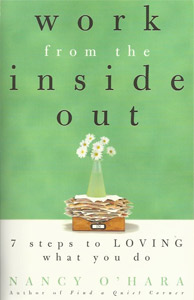(an Escape, an Excuse, a Reason, an Alibi)
…continued from Frustrated Ambitions
Sometimes we simply do not want to face ourselves. There is nothing wrong with taking a break from self-examination once in a while, but often this break becomes a way of life and we never return to the mirror because our mind tells us that it will be just too painful. We are afraid of what we might find. Meanwhile we sit in the pain caused by our refusal to look, and all we can do is learn to live with it.

A Day at the Office
One of the ways we avoid looking at our life is by burying ourselves completely in our work. We live, sleep and eat work. We never stop thinking about it even when we find ourselves doing something else. Work defines us, shapes us, controls us. We call it passion, and others believe and even envy us. But often it is addiction. There is nothing wrong with being passionate about work, but when it begins to affect your health or when your life becomes unmanageable as a result or when nothing else matters, then you can be sure you’ve slipped over the line into obsessive-compulsive behavior. If you want some measure of balance in your life and some spiritual peace of mind, it is imperative that you take stock and begin to change your approach to work.
Denial is the glue that reinforces a work addict’s fortress. And though on the surface it might appear that a work addict is suffering from the thirst for more, it is quite the opposite. What they suffer from is a thirst for non-existence. They use work to lose themselves, to run away from life, to avoid looking inside themselves. This is a tendency we all have to some extent, and it gets manifested in myriad ways. But because of the nature of work, the demands it places on us, the fact that most of us work and understand the inherent pressures, it is easy for someone to get lost in the drug of work without anyone noticing, least of all the addict.
While most of us are probably not addicted to work, many of us use work as a handy excuse to rationalize our spiritual lethargy: “I’m too tired at the end of the day to even think about meditating” or “There isn’t enough time in my day to eat properly, let alone write about my work life.”
Work can also be a convenient scapegoat for avoiding other parts of our lives.
“I’m too busy to see you tonight or to take a vacation,” for instance. It also supports us as we explain our ill manners and rude behavior: “Sorry I’m late, I got caught up at work.” And too often we blame work for our bad moods, taking no responsibility for our disposition. But the fact that we have to work for a living is not to say that we can’t love our work and certainly no reason to blame it for our unhappiness.
_________________________________________________
- Do you know someone who appears to work longer and harder than you do? How does this make you feel about them? About you? Or do you work longer and harder than everyone else does? Why?
- How honest are you with yourself and others? Do you ever beg out of social events using work as the reason? How often is it true? Do you ever blame your cranky disposition on something that happened at work, mistreating those you love? Do you ever work later than necessary to avoid facing a difficulty at home? Do you ever hide out at work? Do you ever procrastinate on tasks at work, so that when you finally get to them and finish them you’ve made yourself late for dinner again?
- Do you feel there is a good balance in your life between the personal and the professional? If not, describe what you would like to change, how you would like it to be. What’s interfering with this becoming a reality?
- Do you spend time each day on spiritual matters? Or do you find excuses and never seem to have the time? Can you for one week schedule fifteen minutes a day to sit quietly alone? Do this and notice the changes in your work attitude. Write about it.
_________________________________________________
There are times when work will take us away from another commitment and create disappointment. This is unavoidable and excusable.
But when we use work to shield us from other aspects of our lives that we’re just not up to facing, eventually we will pay a price.
We will begin to believe ourselves and blame work for our inadequacies, which in turn will create animosity toward work when it isn’t the real culprit. No relationship can withstand such abuse. It is up to us then to be open, honest and fair about our part in this relationship. And when we start treating our work relationship with care then we will be clear about where the abuse, if any, is coming from. (Some work situations are abusive, but we cannot be clear about this until we clean up our own behavior. And once we do, the clarity that comes will make our choices evident and easy.)
So if you take the time to listen carefully to yourself and the words and phrases you use to describe your relationship with work and how it affects the rest of your life, you will mitigate your discomfort. And the negative feelings you have toward your work will gradually slip away.
To be continued…
from Work From the Inside Out – 7 Steps to Loving What You Do






Leave A Comment